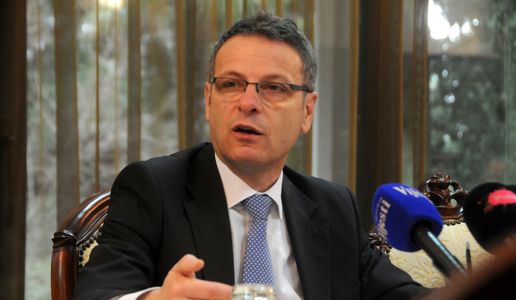Garcevic in The Atlantic on Trump’s Russia Policy
Amb. Vesko Garcevic, Professor of the Practice of Diplomacy and International Relations at the Frederick S.Pardee School of Global Studies at Boston University, was recently interviewed on United States Vice President Mike Pence’s upcoming trip of Eastern Europe in light of the Trump administration’s approach to relations with Russia.
Garcevic was interviewed for a July 30, 2017 article in The Atlantic entitled “The Testing Ground for Trump’s Russia Policy.”
Excerpts from the text of the article:
It’s also very much about Estonians and Georgians and Montenegrins: The vice president is visiting a region that is “somewhere in between the EU and NATO and Russia,” Vesko Garcevic, a former Montenegrin ambassador to NATO, told me. “Therefore, for Russia, this is really a battleground—a place where Russia can influence countries.”
In Montenegro, the threat is more political than military. The former Yugoslav republic joined NATO in June despite Russian vows to retaliate against its onetime ally for taking a “hostile course”—one that would cut the Russian navy off from the Adriatic Sea and reduce Russia’s sway in the Balkans. And several Serbian and Russian nationals will soon go on trial in Montenegro for allegedly planning a coup last fall that would have overthrown the nation’s pro-West government, brought the pro-Russia opposition to power, and thwarted Montenegro’s bid to become part of NATO and eventually the European Union. Montenegrin authorities claim the Russian government was involved in the plot, which the Kremlin denies. Montenegro is a young, fragile democracy, Garcevic observed, and Russia has exploited its “democratic deficiencies” to “gain greater geopolitical influence in the region.”
“People here, politicians, are puzzled with the new administration’s position toward Russia,” said Garcevic. There are moments when that position “seems to be very friendly and forthcoming to Putin,” which suggests the United States is “turning its back to the Balkans,” he explained, and other moments when it appears to be a “more traditional American approach” of fully supporting NATO and America’s European alliances.
“Sometimes it seems like an unguided missile,” Garcevic mused. “You don’t know what’s going to happen next.”
Since Montenegrin officials “are interested in having good relations with the U.S.,” they try to “minimize and downplay, water down, what President Trump says, particularly in his tweets,” Garcevic added. But when I presented him with a scenario—Pence tells the Montenegrin government everything it wants to hear, only for Trump to complain about NATO on Twitter a couple days later—Garcevic acknowledged the limits of this approach. “If Trump says this, this would be like a cold shower,” he responded. “This will cast a shadow over what I’m assuming the vice president will do in the Balkans.”
During his diplomatic career, Amb. Vesko Garcevic dealt with issues pertinent to European security and NATO for almost 14 years. In 2004, he was posted in Vienna to serve as Ambassador to Organization for Security and Cooperation in Europe. He had been a Montenegro’s Ambassador to NATO from 2010 until 2014 and served as a Montenegro’s National Coordinator for NATO from 2015 until he joined the faculty at the Pardee School.
